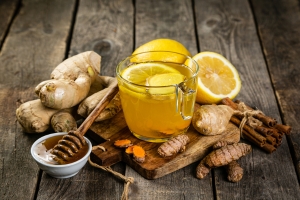Let’s be honest, my gut and I haven’t always seen eye-to-eye. There was that… incident… with some street food I’d rather not relive. The point is, I’ve spent a considerable amount of time trying to understand and improve my digestive health. It felt like a constant negotiation – discomfort, bloating, and a general feeling of unease. Then, during one of my late-night internet deep dives (we’ve all been there!), I discovered the fascinating world of herbal remedies.
I’m not a medical professional, and I’m certainly not claiming to have all the answers. I’m just someone who’s experimented, learned from trial and error (and a few face-palms), and finally found some herbal allies that have made a real difference. I wanted to share them because taking care of your gut shouldn’t feel overly complicated.
So, let’s put aside the overwhelming world of supplements and restrictive diets for a moment. We’re focusing on five herbs you might recognize, but perhaps haven’t fully appreciated for their gut-supporting potential.
1. Tulsi (Holy Basil): The Calming Agent for Your Digestive System

First up is Tulsi, also known as Holy Basil. This isn’t the basil you sprinkle on your pasta. This is a revered herb in Ayurvedic medicine, known for its adaptogenic properties – meaning it helps your body adapt to stress.
And it turns out, stress and gut health are closely linked. Tulsi helps stimulate the production of digestive enzymes, which are essential for breaking down food efficiently and reducing that uncomfortable, bloated feeling. It’s also a potent anti-inflammatory, which is particularly beneficial if you’re dealing with conditions like Irritable Bowel Syndrome (IBS). My grandmother, a firm believer in natural remedies, would have wholeheartedly endorsed this one.
How to Use It (and Dosage): I typically steep 5-7 fresh Tulsi leaves in hot water for 5-10 minutes to make a tea. Aim for 1-2 cups daily. You can adjust this based on how you feel. You can find fresh leaves at many health food stores, or even try growing your own! Other options include boiling the leaves and drinking the water, or even chewing a few fresh leaves after a meal for digestive support.
2. Anise Hyssop: The Unexpected Digestive Aid

This one might be new to you. Anise Hyssop, a member of the mint family, has a delightful licorice-like aroma and flavor. I initially added it to my garden simply because I loved the scent, but then I discovered its hidden talents.
Anise Hyssop is rich in polyphenols, powerful antioxidants that protect your cells from damage. It also boasts anti-inflammatory properties, which can help soothe an irritated gut lining. While more research is needed on humans, that study on fruit flies (showing increased lifespan and stress resistance) is certainly intriguing! It hints at the potential benefits this herb might offer.
How to Use It (and Dosage): I enjoy a tea made from the dried leaves – steep about 1-2 teaspoons of dried leaves in hot water for 10-15 minutes. Start with one cup a day and see how your body responds. You can also add small amounts of fresh leaves to salads for a unique flavor twist.
3. Borage: Beauty with Benefits (Use with Care!)

Borage is easily recognizable by its vibrant blue, star-shaped flowers. It’s beautiful, yes, but it also offers some potential gut-health advantages.
Borage contains gamma-linolenic acid (GLA), an omega-6 fatty acid known for its anti-inflammatory effects. The microgreens (the young, sprouted plants) are also a good source of fiber, which is crucial for maintaining regularity and supporting a healthy gut microbiome.
Important Safety Note: Borage leaves and flowers contain small amounts of pyrrolizidine alkaloids. These compounds can be harmful to the liver if consumed in large quantities over a long period. Therefore, moderation is absolutely crucial. This is not an herb to consume in large amounts daily.
How to Use It (and Dosage): I primarily use borage microgreens, adding a small handful to salads for a refreshing, cucumber-like flavor. You can also consider borage seed oil supplements, which provide a concentrated source of GLA, but always talk to your doctor before taking any new supplement. Because of the potential for liver issues, limit your intake of borage leaves and flowers. Occasional use is generally considered safe for most people, but avoid long-term, high-dose consumption.
4. Epazote: The Gas-Busting Herb

If you’ve ever experienced the uncomfortable aftermath of a bean-heavy meal, you might want to get acquainted with Epazote. This herb is a traditional ingredient in Mexican cuisine, specifically known for its ability to reduce gas and bloating.
Epazote contains compounds that help break down the complex carbohydrates in beans, making them easier to digest and minimizing gas production. It’s also been used traditionally to address intestinal parasites (though more research is needed in this area). It’s surprisingly rich in a variety of nutrients, too.
Important Safety Note: Epazote contains volatile oils, including ascaridole, which can be toxic in large amounts. Again, moderation is key. Pregnant or breastfeeding women should avoid epazote entirely.
How to Use It (and Dosage): Add a sprig of fresh epazote (or about 1 teaspoon of dried leaves) to your pot of beans while they’re cooking. It imparts a distinctive, earthy flavor. You can also add it to soups and stews. For a tea, use a small amount (about ½ teaspoon of dried leaves) and steep for no more than 5 minutes. Limit your intake to 1-2 times per week.
5. Saffron: The Golden Spice with Gut-Soothing Potential

Saffron, the world’s most expensive spice, is prized for its vibrant color and unique flavor. But beyond its culinary uses, saffron offers some promising benefits for gut health.
It’s packed with potent anti-inflammatory and antioxidant compounds, such as crocin and safranal. These compounds can help protect the gut lining from damage and reduce inflammation. Saffron may also help regulate gut motility, which can be beneficial for individuals with IBS. And some studies suggest it may even help alleviate symptoms of acid reflux.
Important Safety Note: Saffron is generally safe in culinary amounts, but high doses can cause side effects. It’s particularly important to be cautious if you’re taking antidepressants or blood thinners, as saffron can interact with these medications.
How to Use It (and Dosage): Steep a few strands of saffron (a pinch, about 0.1 grams) in hot water to make a tea. You can also find saffron capsules, but, again, consult your doctor before taking any supplements, especially if you’re on medication. For culinary use, add a pinch of saffron to dishes like rice, stews, or even desserts.
The Mind-Gut Connection (It’s Real!): It’s important to remember that your gut and your brain are intimately connected. The gut microbiome plays a significant role in producing neurotransmitters, like serotonin, that influence mood and overall well-being. A healthy gut can contribute to a healthier, happier you. And herbs like saffron, with their potential mood-regulating effects, can play a supportive role in this connection.
Important Reminder: Talk to Your Doctor!
Before incorporating any of these herbs into your routine, especially if you have any underlying health conditions, are pregnant or breastfeeding, or are taking medications, it’s essential to consult with your doctor or a qualified healthcare professional. They can help you determine the appropriate dosage and ensure there1 are no potential interactions or risks. This information is for educational purposes and is not a substitute for professional medical advice.
Synthesis
These five herbs—Tulsi, Anise Hyssop, Borage, Epazote, and Saffron—offer a diverse range of potential benefits for gut health. From aiding digestion and reducing inflammation to supporting a balanced gut microbiome, they represent a natural approach to digestive wellness.
- Tulsi (Holy Basil): Improves digestion, reduces inflammation, and supports detoxification. Dosage: 1-2 cups of tea daily.
- Anise Hyssop: Offers antioxidant and anti-inflammatory effects, potentially aiding digestion. Dosage: 1 cup of tea daily, or small amounts of fresh leaves in salads.
- Borage: Provides anti-inflammatory benefits and fiber. Use with caution due to pyrrolizidine alkaloids. Dosage: Limited, occasional use of microgreens.
- Epazote: Reduces gas and bloating. Use in moderation due to volatile oils. Dosage: 1 sprig fresh or 1 tsp dried in cooking, or ½ tsp dried for tea, 1-2 times per week.
- Saffron: Exhibits anti-inflammatory and antioxidant effects, may improve gut motility and soothe digestive discomfort. Dosage: A pinch (about 0.1 grams) in tea or food.
Remember, individual responses to herbs can vary. Start with small amounts and listen to your body. Your gut deserves this TLC!







